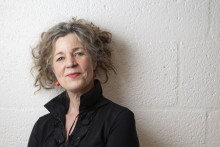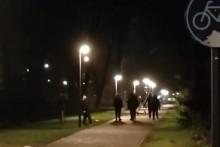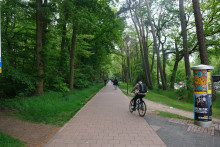It is wonderful that institutions have begun offering live streams or virtual visits in which people can scroll from one painting to another. For me, it is all too smooth and sterile: experiencing these things via a screen doesn't come close to the real thing. I miss the murmur of the crowd in a room. The physical presence of other people. The smell of someone who ate too much garlic at dinner or applied their perfume a bit too generously. The palpable excitement before a performance begins. The silence that sometimes falls when something special happens. Talking about what you just experienced as you wait to retrieve your coat amid a throng of people. Such sensations always gave the experience extra dimensions for me.
It is more than just an experience. Culture also gives you the opportunity to develop other thoughts. Some experts come up with impressive-sounding philosophies. My point is that you discover new and different ways to look at, listen to, smell and taste the world around you or yourself and that this will lead you to new interpretations. It sharpens your mind and broadens your perspective. The same belief was held by the people who founded the Twente Technical College (THT) in 1961. From the very beginning, the campus was more than just a place to study and conduct research. Culture was deemed to be an essential aspect of it as well. Students were given every opportunity to make music together. Start bands. Organise shows and expositions. Discuss politics, religion and life itself. Prominent authors like Mulisch were invited to come to Twente by the Drienerkring, whose name was a reference to the famous seventeenth-century Muiderkring of P.C. Hooft and Maria Tesselschade.
The THT also collected art; these days, its collection contains more than a thousand pieces. Artists were also commissioned to create statues, such as Ger van Elk, who came up with the Sardineblik on the Drienerlolaan. Wim T. Schippers designed the “Torentje” in the pond in front of the Vrijhof.
Campus dean Jan Schuijer introduced a special Schuijer Campus Culture Prize long after his retirement. Every year, this prize was given to a student with a remarkably artistic talent, whether it was breakdancing, playing the drums or juggling. There were only two conditions: the student had to be a member of an association, i.e. create something together with others, and obtain good grades...
Yes, I hate to see culture suffering so badly during this pandemic. What I miss most of all are the moments when, in the middle of a concert, you suddenly hear a single note that has an unearthly beauty to it. Discover a fantastic shade of red in a picture. Are moved by an asynchronous dance move or a mysterious shadow. Culture gives you the opportunity to transcend yourself. Call it mysticism or a different form of consciousness. That is why I hope that the UT will work even harder to stimulate the cultural life of its students. I want everyone to get a chance to experience that single second of transcendence. Breaking away from yourself. Being free. I long for culture for that single second.
Hiska Bakker is a historian, journalist and a presenter at Studium Generale.







